High school theater class ditches classics to perform play about life in Kensington
-
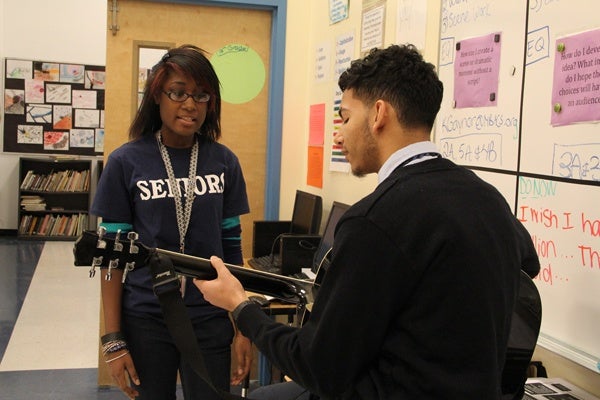
Khiah Warren and Jose Echevarria prepare for their musical number. (Emma Lee/for NewsWorks)
-
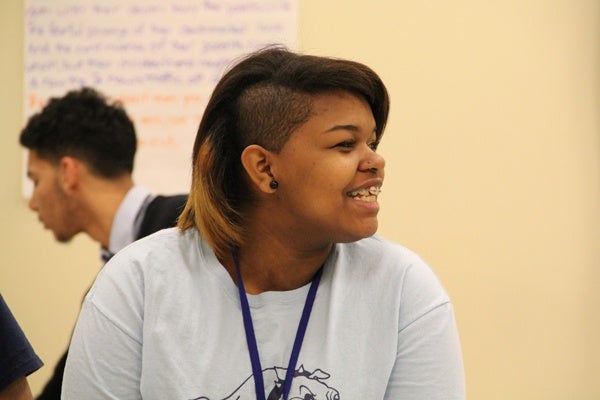
Julissa Valentin, a student in Kathleen Gaynor's acting class at Mariana Bracetti Academy Charter, grins as she reads through her scene with classmates. (Emma Lee/for NewsWorks)
-
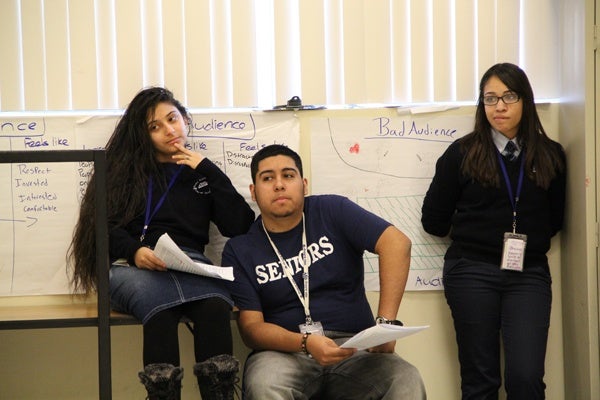
Samary Malave, Onix Pagan and Jennifer Monserrat listen to instruction from lead teaching artist Hannah Tsapatoris Macleod. (Emma Lee/for NewsWorks)
-
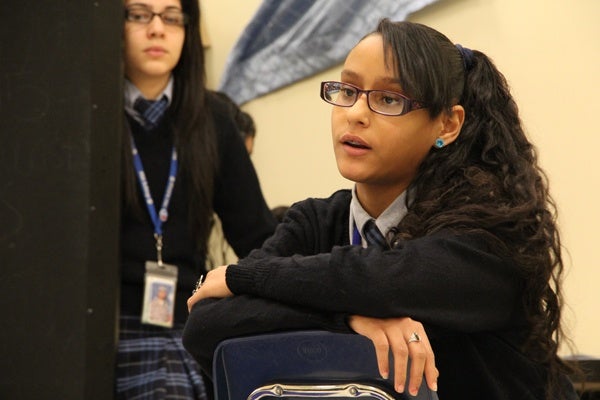
Tatiana Espada delivers a monologue during her Scene Work and Improvisation class at Mariana Bracetti Academy Charter. (Emma Lee/for NewsWorks)
-
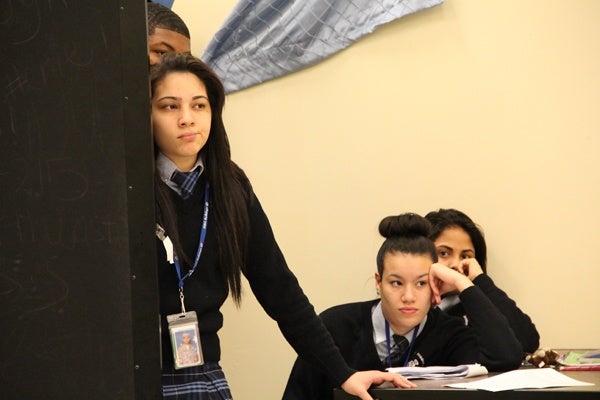
Students Zulydivad Ortiz-Mendez, Natalie Morales and Anneska Maldonado, watch their classmates perform while they wait for their next scene. (Emma Lee/for NewsWorks)
-
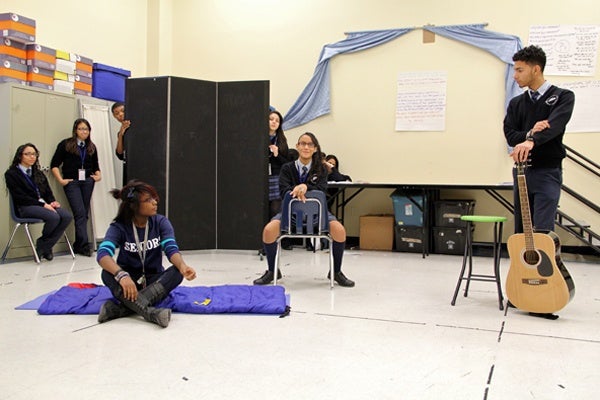
Kathleen Gaynor's acting class at Mariana Bracetti Academy Charter has students performing each other's work, an exercise in empathy. (Emma Lee/for NewsWorks)
-
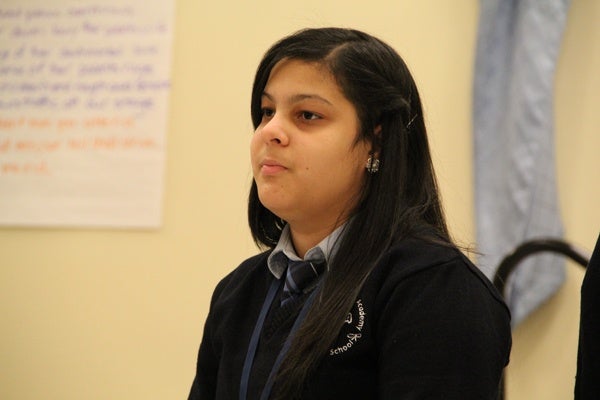
Marlenne Cruz wrote a story of domestic violence for her Scene Work and Improvisation class at Mariana Bracetti Academy Charter. (Emma Lee/for NewsWorks)
-
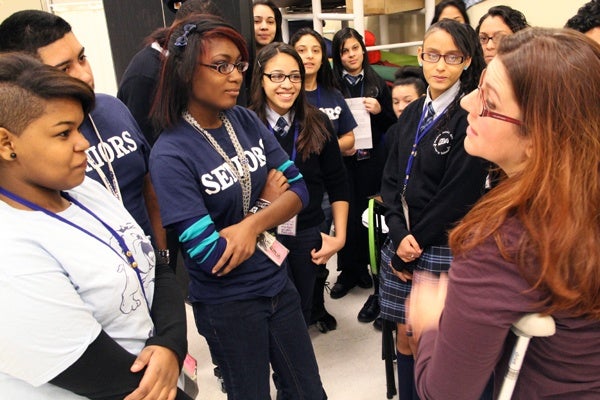
Lead Teaching Artist Hannah Tsapatoris Macleod gives her students a pep talk after their first performance for a test audience. (Emma Lee/for NewsWorks)
-
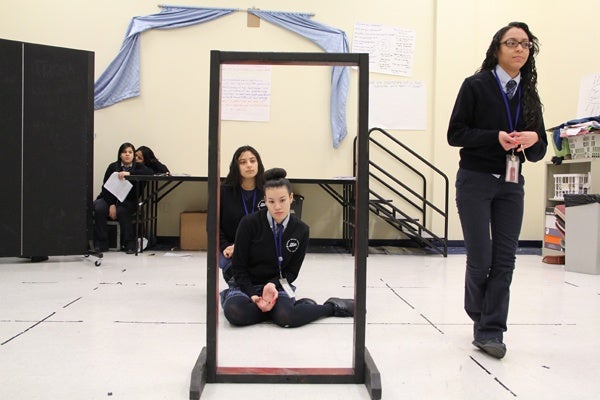
Students, from right, Jennifer Melendez, Natalie Morales, and Samary Malave act out a vignette about body image as part of their Scene Work and Improvisation class at Mariana Bracetti Academy Charter school. (Emma Lee/for NewsWorks)
When most people think of high-school-theater productions, they tend to think of the classics: something written long ago, set somewhere far away, performed by teenagers trying desperately to come off as adults.
But for the drama class at Mariana Bracetti Academy High School in Kensington, that model just isn’t cutting it anymore.
Instead, students there are tapping into their own lives to tell stories about growing up in some of the most crime-ridden sections of Philadelphia.
For many at Bracetti, it’s almost impossible to be a stranger to what’s happening on the worst of Philadelphia’s streets.
Seventeen-year-old senior Khiah Warren sees it all a few blocks from the school.
“Drug dealers and crackheads and prostitutes walking around on Somerset and stuff,” she said. “My mom doesn’t even want me to pass there.”
Fourteen year-old freshman Tatiana Espada would rather stay inside all day then test playing outside in her North Philly neighborhood.
“I live in a ghetto sort of, so it’s like really bad up there,” Espada. “A lot of bad things happening.”
Senior Marlenne Cruz, 18, is still haunted after being jumped on her way home from school a few years back.
“I actually walk around with pepper spray,” Cruz said. “I just feel scared walking. I don’t feel safe.”
A new model
Hearing these kinds of stories led Bracetti’s drama teacher, Kathleen Gaynor, to reimagine the typical high-school theater experience. Forget “Oklahoma” and “South Pacific,” she says, let the kids act out their own works.
“I wanna give my kids a voice. Especially in the neighborhood that I teach in, I think it’s important to empower them,” Gaynor said. “And I don’t think necessarily doing a musical is something that gives them their voice.”
The program, called “Of Mythic Proportions,” is made possible through a partnership with the Barrymore Award-winning “B. Someday Productions.”
The Fishtown-based company cobbles together $10,000 in grant money to help Gaynor’s class produce and stage two free public performances per year.
Exercise in empathy
Each semester, a B. Someday teaching artist guides Bracetti’s drama class as they turn their intimate journal entries into a full-fledged narrative. After the play is written, the students divvy up the parts and begin memorizing their lines.
Typically, the students don’t act out the lines that they themselves have written.
To Samary Malave, the process of performing the writing of others is one big exercise in empathy.
“I moved on from it, and somebody else is reading it, somebody else is experiencing what I did just by reading what I wrote,” said Malave, 18.
B. Someday’s artistic director, Michelle Pauls, couldn’t agree more.
“I’m put into this position where I have to get to know these people and I have to learn to rely on them, and they have to rely on me,” Pauls says, getting into the students’ heads.
“And now they’re not just these kinds of nameless, faceless people who pass me by, but they’re people, real people, who I know and who have troubles and challenges just like me,” she says.
Kensington themes
This semester’s play features some themes familiar to most teens: the struggle for identity, self-worth, and love, but also themes unique to neighborhoods such as Kensington.
Cruz wrote about the time she witnessed one of her uncles put a gun up to her aunt’s head.
She says she “just happened to be the person around at the moment.”
Typically a quiet, reserved student, her account of the family altercation is perhaps the play’s most intense scene.
In the production, it’s performed by classmate Julissa Valentin.
“He stood there pointing a gun at her while she cried and cried. I was frozen,” Valentin says, reading Cruz’s writing during a rehearsal. “I had to decide — should I call the cops and take the chance of my uncle being deported, or in jail for attempted murder, while having to deal with the thought that my cousins will be growing up without their father around?”
When Cruz talks about the incident now, she speaks with an air of world-worn cynicism. A neighbor actually ended up calling the cops, but when they arrived, the uncle had hidden the gun and the officers didn’t charge him.
To her, it’s just another of the things she has to carry on the way to making a better life for herself.
Someday, Cruz hopes to become a psychologist. In the meantime, on top of school, she works 25 hours a week at a fast-food restaurant to help her family pay bills. When she’s not doing that, she’s trying to keep her two middle-school-aged brothers on the right track.
The potential of doing better
“Our generation of my family, like my cousins and everybody, just wants to prove that we could do better,” Cruz says.
“We could get out of this thing, we could graduate, be successful. We could make money, like we don’t have to live like my family members live. Like I have uncles who live, like off the government on welfare and selling drugs and stuff like that,” she says. “It shouldn’t be that way.”
While Cruz struggles toward that goal, she says the act of writing about her life has made getting by a bit easier.
“It helped me in a way to let things out, personal things out,” said Cruz. “Writing it down taught me that just writing itself makes a difference.
“You’ll be surprised, but you’ll feel better afterwards just because you let it out, like you let it out your system.”
The work done by Cruz and her classmates culminated with a public performance on Monday at the Walking Fish Theater on Frankford Avenue.
WHYY is your source for fact-based, in-depth journalism and information. As a nonprofit organization, we rely on financial support from readers like you. Please give today.

